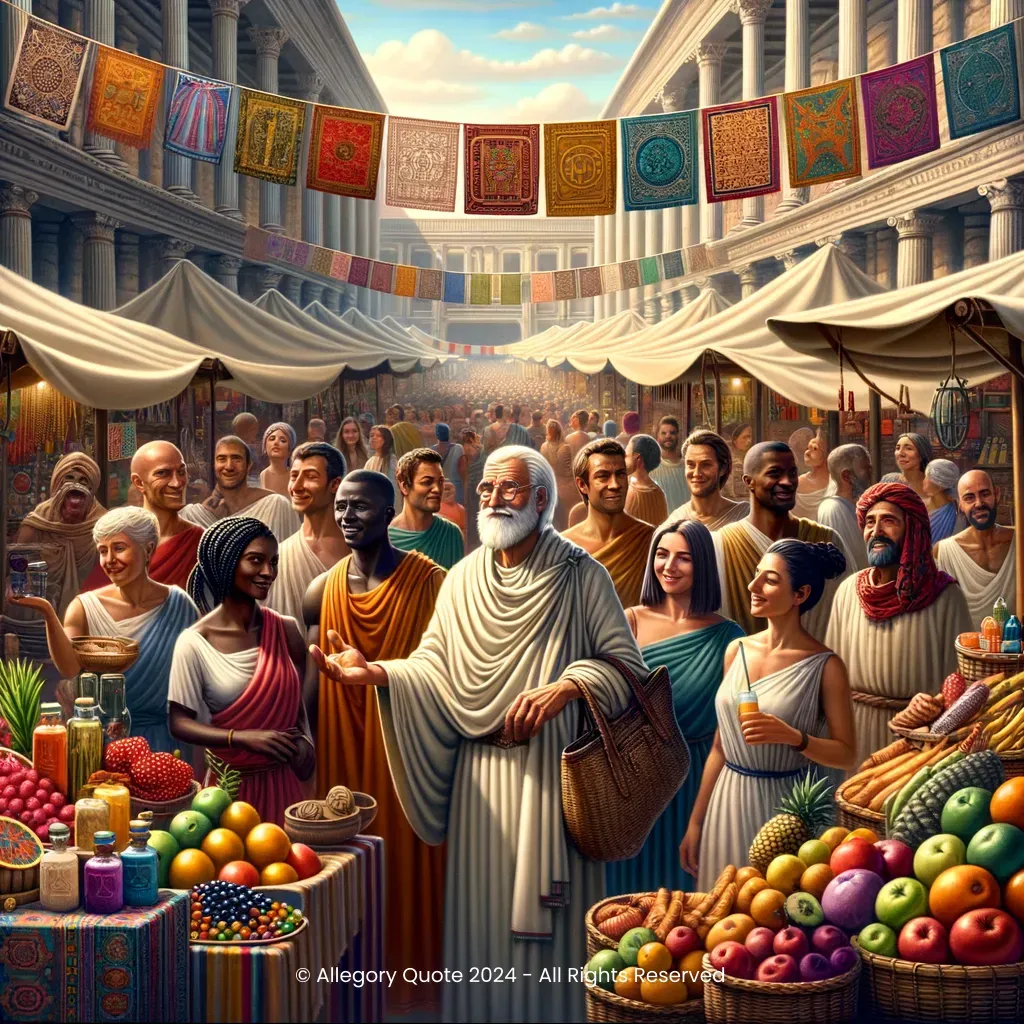De gustibus non est disputandum

0
0
0
0
- Meaning
- This aphorism expresses the idea that individual preferences or tastes are subjective and not subject to universal evaluation. It highlights the notion that personal likes and dislikes are inherently personal and therefore cannot be objectively argued. It is grounded in the acceptance of human diversity and the recognition that what may be pleasing or displeasing varies greatly from one person to another.
- Allegory
- The elements in this image serve to embody the essence of the aphorism. The vibrant market represents the myriad of human tastes and preferences, illustrating how different things appeal to different people. The wise sage symbolizes wisdom, observing and accepting the diversity around him, while maintaining a serene disposition. The assortment of goods, from fruits to artworks, showcases the wide range of human likes and dislikes. The banner above encapsulates the core message of the aphorism, promoting a visual and thematic acknowledgment of subjective preferences and mutual respect. The lively, harmonious setting highlights the positive impact of embracing individual differences in our daily lives, underlining the phrase's timeless significance.
- Applicability
- This phrase can be applied in various personal and social situations involving differences in opinion, particularly regarding aesthetics, food, art, and other subjective experiences. It encourages respect for differing tastes and avoids needless arguments over personal preferences. Whether you're choosing a movie with friends, picking a restaurant, or debating fashion choices, this aphorism reminds us to appreciate and accept diversity in tastes.
- Impact
- The impact of "De gustibus non est disputandum" on culture and society has been significant in promoting tolerance and mutual respect for individual differences. It has been cited in numerous philosophical, literary, and ordinary contexts to defuse conflicts and promote understanding. The concept it embodies is fundamental to multiculturalism and global coexistence, resonating with modern ideals of diversity and inclusion.
- Historical Context
- The phrase's origin can be traced back to the Roman civilization, reflecting the sophisticated cultural and philosophical landscape of ancient Rome, known for its exploration of human nature and societal norms.
- Criticisms
- Criticisms of this phrase often revolve around the idea that some tastes or preferences might still be subject to ethical or moral scrutiny. For example, taste in art or entertainment can sometimes cross into controversial territory, raising debates about what is acceptable or harmful. Critics argue that some preferences, while subjective, can still have societal impacts that merit discussion.
- Variations
- In other cultures, similar sentiments are expressed differently but align with the same core idea. For example, in French, the phrase "Chacun ses goûts" translates to "Each to their own taste." In many non-Western cultures, there are analogous expressions that speak to the uniqueness of individual preferences and the importance of respecting them. The essence remains consistent: personal tastes are deeply personal.
-

Divide et impera.
-

Cogito, ergo sum.
-

Nemo propheta in patria.
-

Better three hours too soon, than a minute too late.
-

Dum spiro, spero.
-

Caveat emptor.
-

Fortis Fortuna iuvat.
-

Aut vincere aut mori.
-

Fama volat.
-

Vivere est militare.
-

In dubio, abstine.
No Comments